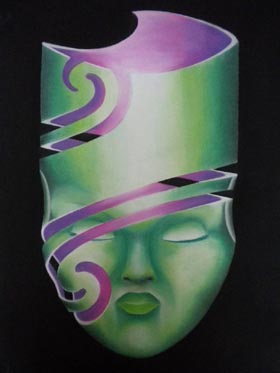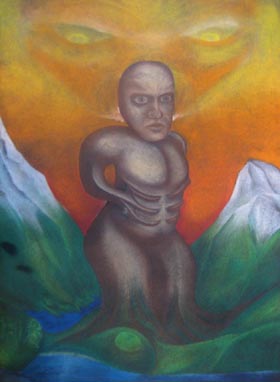Prisoner profile: art is a way to keep focussed
20 July 2011
Right from the outset, Jay Bizell (not his real name) has been highly motivated, taking on technical challenges that often scared him. But his eagerness to learn outweighed this fear.
 Jay is one of approximately 80 prisoners studying art from Corrections’ facilities around the country, using the distance-learning processes at The Learning Connexion. Sharon Hall, Restricted Programmes Co-ordinator and Distance Delivery Mentor at The Learning Connexion, says that Jay has been particularly successful with chalk pastels as a medium.
Jay is one of approximately 80 prisoners studying art from Corrections’ facilities around the country, using the distance-learning processes at The Learning Connexion. Sharon Hall, Restricted Programmes Co-ordinator and Distance Delivery Mentor at The Learning Connexion, says that Jay has been particularly successful with chalk pastels as a medium.
“His patient and determined nature with such a messy material has provided him with the ability to create some very striking work,” Sharon says.
 Jay has graduated from the certificate programme and is currently enrolling in the diploma programme. One day, he says, he would love to be able to teach art and share what he has learned with people willing to learn and who appreciate the value that art has.
Jay has graduated from the certificate programme and is currently enrolling in the diploma programme. One day, he says, he would love to be able to teach art and share what he has learned with people willing to learn and who appreciate the value that art has.
“I would be keen to help others extend on the skills they already have and help them see where this could go because skies the limit for them – just like for me,” he says.
Jay responded in writing to Sharon’s written questionnaire and his answers are unedited.
1. Before enrolling in the course, how much art-making experience did you have?
Not as much as I would have liked but I did take carving and Tech Design classes at high school. I enjoyed the more creative and hands-on classes rather than science or maths.
2. What do you most enjoy about the course you’re doing with The Learning Connexion?
 I enjoy developing my skills as much as the feedback I get. I really enjoy learning new things and have been excited to learn new techniques for my painting. The course has been a good way to keep my mind occupied, focused and dedicated. The encouragement from feedback keeps me on the right path and pushes me to stay focussed.
I enjoy developing my skills as much as the feedback I get. I really enjoy learning new things and have been excited to learn new techniques for my painting. The course has been a good way to keep my mind occupied, focused and dedicated. The encouragement from feedback keeps me on the right path and pushes me to stay focussed.
3. Do you think it’s important to have good arts instruction and a mentoring process that supports the development of your art?
Yes because if I didn’t have the support and instruction from my mentor I would lose focus. This helps me think forward to the next thing that I might create and encourages me to keep going.
4. What are the things that art teaches you most about?
To never give up. The only thing that can beat me is myself. I use my art as a way of keeping focused and staying out of trouble while being in jail. Art reminds me that I can achieve things if I set my mind to it.
5. What sort of problems have you overcome in the process of making art?
 I find the whole process of making a painting is a problem. It’s a problem right from the beginning. This problem is what inspires me to make the painting. I don’t do a lot of drawings or plans, and I paint straight from an idea that comes to mind so this is a problem. How am I going to get this idea from my mind on to the canvas? This process is hard but also fun. I like the challenge of working this all out (fixing the problem or working it through).
I find the whole process of making a painting is a problem. It’s a problem right from the beginning. This problem is what inspires me to make the painting. I don’t do a lot of drawings or plans, and I paint straight from an idea that comes to mind so this is a problem. How am I going to get this idea from my mind on to the canvas? This process is hard but also fun. I like the challenge of working this all out (fixing the problem or working it through).
6. Do you think the skills you learn when you’re making art transfer to other things you do in your daily life?
Yes. It has helped me to become a bit more flexible. This question is slightly more opposite for me in that I think my life transfers into my art and I don’t mean this in a literal way. My art work is a place for me to escape, feel comfortable and not be concerned about all the other stuff. It boosts my attitude and confidence and helps my behaviour. Being able to make art is soothing and healing.


